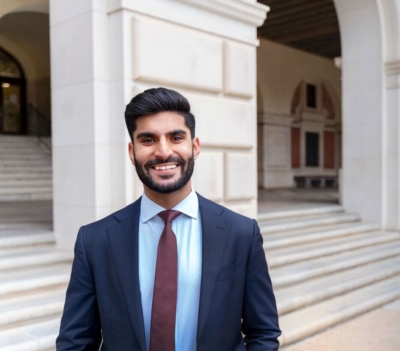
Salman Al-Luqman, University of Houston (Bauer)
7) Business Is Holistic: “In my view, business is the study of organizational theory and coordinated optimization. The seemingly separate finance, accounting, supply chain, marketing, and human resource units of a firm must find a rhythm that allows them to achieve a collective goal. Finding that rhythm is both an art and a science. The biggest lesson I learned in studying this field is that, irrespective of an enterprise’s mission – whether it is steadfastly humanitarian or purely capitalistic – the fundamentals of how social units dance to the same tune, so to speak, is the same. In short, studying business taught me how the units of an enterprise move and evolve in unison, and how to generally approach the problems of organization, optimization, and execution.”
Salman Al-Luqman, University of Houston (Bauer)
“The biggest lesson I learned studying business, largely due to the comprehensive curriculum at Scheller, is that every component of a business truly matters. The best finance department will be inhibited by poor organization, or poor management of human capital. The most revolutionary product can’t be rolled out to market with a faulty supply chain. Maintaining and sustaining a competitive advantage, particularly given the leveling effects of technology, requires total harmony and understanding amongst all your business units. I am thankful that Scheller affords students exposure to each element of business in order to groom future leaders.”
Jake DiBenedetto, Georgia Tech (Scheller)
8) You Create Your Own Luck: “I have felt extremely fortunate throughout my college career, but I am able to recognize that the opportunities I’ve been given have largely arisen out of the efforts I have taken by networking, making connections, giving my full effort in my classes, and getting involved on campus. In the business world, success often relies on who you know and what your reputation is. The importance of networking and preparation to set yourself up for success is crucial. Luck rarely comes to those who sit around and wait for it – luck is when preparation meets opportunity.
Olivia Dubi, University of Miami

Sven Wollschlaeger, University of Michigan (Ross)
9) Practice Makes Perfect: “Business, just like engineering, is a reps-and-sets game. So go get out there: go build a company, trade your money, create a newsletter, become a thought-leader, gather a Twitter following, flex your entrepreneurial muscle, and sharpen that business acumen. Business school teaches you to succeed in different systems. It teaches you to be the “Man in the Arena” (Teddy Roosevelt).”
Sven Wollschlaeger, University of Michigan (Ross)
10) The Textbook Is Not The Real World: “Through my experience these past few years, I have had the opportunity to work through problems with real businesses as well as solve simulated issues that come from the real world. In either case, it has become more evident that having strong problem-solving skills and being able to think through the issues and communicate with your team is much more vital than knowing what’s in the textbook. Understanding concepts is very important, but real-world problems are never as simple as knowing an equation or a definition. Rather, you need to be able to talk through the problem with both your peers and superiors and creatively arrive at a solution that can work.”
Matthew Iaconis, Worcester Polytechnic Institute
11) Your Network Is Your Net Worth: “I learned how valuable teamwork really is to both personal and professional development. Teamwork is not simply working to solve problems or complete an assignment more efficiently. It is also learning from the members of your team who may have vastly different perspectives than your own and utilizing each person’s strengths to better the team’s end product and the group as a whole.”
Jessica Anton, University of Wisconsin
12) Question The Status Quo: “I’ve learned that the things we call “tradition” are often habits or norms detrimental to greater progress. Many of my business classes have taught me to challenge expectations and innovatively think about ways to improve the current to create the future.”
William Ryu, College of William & Mary (Mason)
“Ask a lot of questions. It’s true in finance, where you’re evaluating assumptions and understanding projections. It’s true in accounting, where every financial statement tells a story, and it’s important in all aspects of a business to have a thorough understanding of any situation you are in. I have learned so much from asking one question, and then finding three more questions to ask until I do understand more about the person I’m talking to, the problem I’m solving, or the opportunities I’m evaluating.”
Kayla Fixel, University of Minnesota (Carlson)

Leah Wren Hardgrove, Washington University (Olin)
13) One Person Can Disrupt The Marketplace: “James McKinsey, a farm boy from Missouri, started McKinsey & Company and practically created the demand for consulting firms. Ty Warner converted stuffed animals into a currency with Beanie Babies. Brian Chesky turned his near apartment eviction into AirBnb. Business gives you the leverage to make a change in society, to build something so unique or provide a service so special that the world can become a whole new place. The knowledge and inspiration I’ve gained from studying business will help me achieve my goal of making society accessible to all, regardless of physical or mental abilities.
Leah Wren Hardgrove, Washington University (Olin)
14) Leadership Is Different Than Position: “The biggest lesson I gained from studying business is how to be an effective leader. Coming into business school, I thought leadership had everything to do with authority and fancy titles. I remember during my first year wondering how I could get to higher roles in my extracurricular activities. Over the past few years, I recognized that leadership is not merely having authority or holding a title. It also includes compassion, effective communication, and work ethic. In my leadership roles now, I understand that I have a responsibility to help others like my mentors have guided me.”
Kelsea Wong, Villanova University
“The Cornell School of Hotel Administration has given me the opportunity to combine two of my biggest passions: business and service. The biggest lesson I have learned is how to apply a service mindset and servant leadership to any business scenario. Whether it is leading a team to evaluate a complex investment case or resolving an organizational conflict, being people-oriented and other-centered helps us build relationships, make holistic decisions, and create long-term value.”
Carol Wang, Cornell University (School of Hotel Administration)
15) The Public Sector Plays An Integral Part In Business: “As part of the Business and Political Economy program, I’ve learned that “institutions matter.” Businesses interact with and rely on a complex network of governmental and cultural institutions in order to succeed. I didn’t truly grasp this concept until I spent a year studying abroad in London and Shanghai, where I was able to witness first-hand how the success of businesses depends greatly on the political structures, cultural norms, and laws and regulations present in a given market (e.g. Brexit!). The private and public sectors are much more intertwined than I ever imagined, and studying business internationally helped me gain a holistic and cross-cultural understanding of why institutions matter in the corporate world.”
Jessica Wang, New York University (Stern)
After studying in the McDonough School of Business, I have come to appreciate the impact and reach of the private sector. While many corporations receive a bad reputation of “putting profits first,” business school has also taught me that firms have the capability to drive innovation and create a better world for future generations. With the right goal and guided by strong values, business is a tremendously effective vehicle to lift up members of our society. Further, I have come to recognize the effects of business on the public sector and its influence in shaping legislation. Understanding this bilateral relationship has helped me appreciate the full reach and impact of business.
Michael DuTot, Georgetown University (McDonough)
DON’T MISS:











Questions about this article? Email us or leave a comment below.